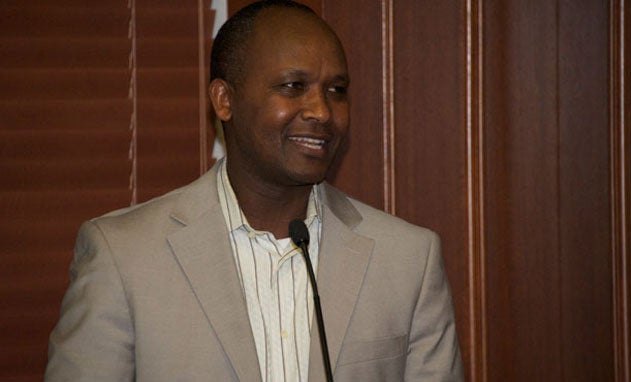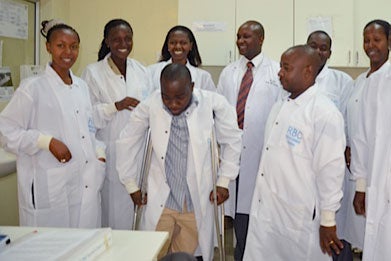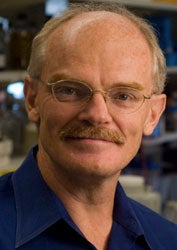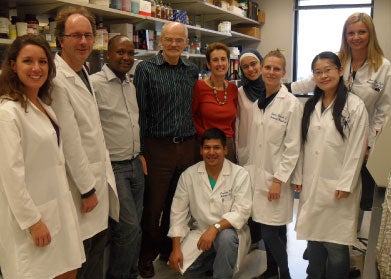Title: Jesuit Alumnus Helps Direct Biomedical Center in Rwanda
Rev. Jean-Baptiste Mazarati, S.J., (G’12) combines his Jesuit training as well as his education at Georgetown in his work as deputy director general at Rwanda Biomedical Center.

Nearly 20 years after the brutal genocide that claimed hundreds of thousands of lives in Rwanda, Rev. Jean-Baptiste Mazarati, S.J., (G’12) is among those in the country working to ensure its remaining residents receive the best health care possible.
“With the 1994 genocide against the Tutsi, Rwanda hit the bottom, and it is now slowly but surely emerging from its nightmare,” says Mazarati, who lost family members during the 100 days of tyranny that began in April of that year. “Rwanda has put many mechanisms in place to make sure the country emerges from its ashes.”
Mazarati completed his doctoral studies in tumor biology at Georgetown Lombardi Comprehensive Cancer Center. He originally was appointed in February as head of the Rwanda Biomedical Center’s National Reference Laboratory (NRL) and now serves as the center’s deputy director general.
Eradicating Disease

Rev. Jean-Baptiste Mazarati, S.J., (G’12), center in back row, poses with his colleagues at the Rwanda Biomedical Center’s National Reference Laboratory (NRL).
At the NRL, Mazarati was responsible for overseeing, supporting and developing Rwanda’s medical laboratory system and aligning it with the country’s decentralized health system.
“Our country is landlocked, [so we don’t have] many natural resources,” he says. “Our main resource is our people. The government has made an investment in ensuring that Rwandans are educated and healthy enough to drive our nation’s development.”
In his new role as deputy director general, Mazarati oversees the biomedical services, which includes the NRL, National Center for Blood Transfusion and the Medical Maintenance Center.
“As so for many developing countries, Rwanda is still striving to eradicate all infectious diseases – HIV/AIDS, tuberculosis [and more],” the alumnus says. “We are running programs to see malaria eliminated, and we are taking on the daunting task to fight noncommunicable diseases, such as cancer, cardiovascular diseases, diabetes and so on.”
Diagnostic Power
Noncommunicable diseases account for 29 percent of the deaths among Rwanda’s more than 11 million citizens and the average life expectancy is about 52, according to the World Health Organization.
“I would love to enhance our diagnostic power, expand our dedication to health sciences in our educational system and help open new opportunities for clinical research at the National Reference Laboratory and throughout our hospitals’ network,” Mazarati says.
He’s hoping to do that with a little help from his former professors and mentors at Georgetown Lombardi – Rev. Kevin FitzGerald, S.J., and Dr. Anton Wellstein.
Engaging the World

Rev. Kevin FitzGerald, S.J.
FitzGerald, an associate research professor and the David Lauler Chair for Catholic Health Care Ethics, met with members of Rwanda’s health ministry this past summer.
“[The health minister] wants Rwanda to engage with the world,” FitzGerald says. “On both those levels – [providing better health care and improving the nation’s global reach], Jean-Baptiste is going to be able to make a contribution. He has the education, but he also has the experience of having lived and studied in Europe and the United States.”

Dr. Anton Wellstein
Wellstein, professor of oncology and pharmacology, mentored Mazarati.
“His research looked at how bone marrow cells help cancer cells invade locally into blood vessels and then spread in the body,” Wellstein recalls. “His focus was how normal bone marrow can be a culprit and helper in this process of cancer invasion and metastasis.”
Mazarati wants to bring the same kind of research he was able to conduct at Georgetown into Rwandan labs, but the country lacks many of the resources to do so.
Providing help
“They need the equipment and the training,” says Wellstein. “That we can provide. The highest level of training is in the diagnosis. When someone looks through the microscope, they need to recognize what they’re looking at and what it means.”
A possible collaboration between Georgetown and the Rwanda Biomedical Center is in the beginning stages and Wellstein says there is an abundance of opportunity on both sides.
“By the end of this year, we should have a pretty good survey of what is needed,” he says.
Reconnecting with Research

Rev. Jean-Baptiste Mazarati, S.J., (G’12), third from left, grew close to his fellow graduate students working in Dr. Anton Wellstein’s lab at the Georgetown Lombardi Comprehensive Cancer Center. He wound up blessing some of their weddings and baptized their children in his role as a Jesuit priest.
Mazarati came to Georgetown after completing his Sacred Theology Licentiate studies at Weston Jesuit School of Theology in Cambridge, Mass.
“I wanted to reconnect with science and research after years in theology,” he explains.
Mazarati says education and service to others are just two of the traditions he most appreciates as a Jesuit priest and scientist, and he remembers his time at the university with great fondness.
Getting Beyond Challenges
“At Georgetown, I was not only a student but also a priest,” Mazarati says. “I ended up blessing my lab colleagues during weddings and conferring baptism upon their kids. I even used to celebrate a Christmas Mass for lab members and their families.”
FitzGerald says getting to know Mazarati as a student and fellow Jesuit were rewarding for him and the university community.
“He’s very committed to making things better for his country, his people – people of Africa in particular – and trying to help people get beyond the challenges of life,” the Georgetown professor notes.